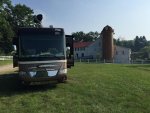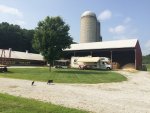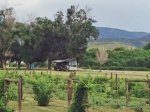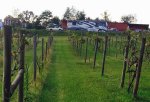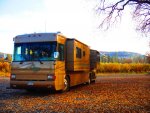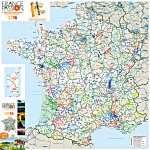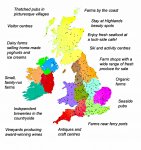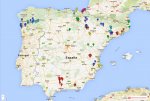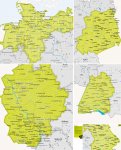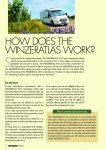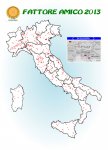Hi
back woods,
I have a question to ask you because, well, you are you.
The issue has come up whether it's realistic to imagine the TerraLiner dry-camping or "boondocking" for extended periods (3 - 6 months) on farmland.
A while back
egn wrote that
"camping on farmland is an illusion", because farmers would not want their soil compacted by the long-term presence of a large motorhome, they would not want the noise of a generator, and so on. I was quite surprised when
egn wrote this. I respect
egn's views very much, but I wonder if he may be wrong on this particular point. Immediately I thought that the problem of soil compaction would only be a worry for farmers who specialize in market gardening, i.e. vegetables, strawberries, etc. But this would not necessarily be an issue for a large ranch, a horse farm, a dairy farm, a vineyard or orchard, and a wide variety of other kinds of farms. And especially not for those farms that are already set up partly as
"agriturismi", as farms that welcome vacationers, and function as part-time B&Bs or boutique hotels.
Your profession puts you right in the thick of farms and farmers, but at the more "equine" ends of things.
So the question is this:
How realistic do you think it would be, imagining the TerraLiner traveling through Second and Third World countries that do not have developed RV facilities (no paved pitches with hookups), and dry-camping instead, for long periods on land rented from farmers, perhaps horse-farms or ranches in particular?
********************************************
The question is not whether it would be realistic for a vehicle like the TerraLiner to boondock for such a lengthy period. Rather, the question is whether it's realistic from the point of view of potential host-farmers. Whether or not they would be interested.
Remember, the TerraLiner is being designed for "mostly silent" camping, with a large generator recharging a large battery pack at most once every three or four days, and usually more like once every week or 10 days. And the generator will run for only 2 hours or less when it recharges the battery pack. Solar will be massive too, supplementing the generator. So the TerraLiner will not be "noisy" as per large motorhomes that often run their 20 KW generators around the clock, especially when the A/C is on. Thanks to a large battery pack, large generator, and massive solar, the TerraLiner will have the ability to camp mostly in silence, even though it will be a high-energy-usage camper, when the A/C is running in particular.
Also remember that the TerraLiner is projected to slow-travel, so the farmer might look forward to 3- 6 months' rent. The arrival and departure of the TerraLiner would be the most demanding times from the farmer's point of view. So the hassle-to-rent ratio would be very low for him, at least in comparison to staying for just a few days, or just a few weeks.
The TerraLiner will also be designed to be unusually autonomous in terms of water, sewage, and power, and would leave no greywater or blackwater mess behind. For instance, it will have an incinerating toilet, probably a Cinderella, because Cinderalla incinerating toilets promise to be odor-free.
Are you familiar with "
Harvest Hosts", a network of farms that host RVs to dry-camp -- for free! -- for a night? See
https://harvesthosts.com ,
https://harvesthosts.com/invitation.htm ,
https://harvesthosts.com/Maps.htm ,
https://harvesthosts.com/faq_page.htm#What_kind_of_vehicles_are_allowed ,
https://harvesthosts.com/faq_page.htm#large_RV ,
https://harvesthosts.com/faq_page.htm#generator ,
https://harvesthosts.com/faq_page.htm#24_hours ,
https://harvesthosts.com/Host_Location_Photos.htm ,
https://www.flickr.com/photos/harvesthosts/ ,
https://harvesthosts.com/press.htm ,
https://harvesthosts.com/who_is_hh.htm , and
http://www.gonewiththewynns.com/harvest-hosts-free-rv-parking-farms-wineries:
Although set up as an overnight program, longer stays are possible at the discretion of the farmers. This is a U.S.-based scheme, but if farm-camping is possible in the U.S., then there should be no reason why one could not make arrangements in advance to stay at farms right across the planet. Specialist companies serving niche-markets in "Agri-Tourism", "Organic Farm Tourism", "Eco-Lodge Tourism", "Ranch Tourism", and "Equine Tourism" could set things up.
The first video is especially interesting, because the Wynns (perhaps America's most famous RV couple) discuss farm camping comparatively, within the wider context of different motorhoming styles and possibilities. As they write on their website:
Let's face it, finding a real and authentic experience these days is becoming more…and more difficult. Campgrounds and RV Resorts are turning into glorified parking lots with electrical boxes, water spigots and hotel sized fees. We started RV'ing to find adventure, escape suburbia and enrich our lives. So, we're ditching the parking lots for farms & wineries!
We've been staying at farms and wineries since we first started RV'ing and these stays have been some of our most unique experiences. We usually found these opportunities through friends but it wasn't something we could do everywhere, much less something we could easily suggest or recommend you to do.
Enter Harvest Hosts; a camping program created by a couple of fellow RV'ers who love staying at unique places as much as we do. We've been members of HH for over a year now and have gotten a lot of questions about the program.....
See
http://www.gonewiththewynns.com/harvest-hosts-free-rv-parking-farms-wineries: . In their video the Wynns took the words right out of my mouth:
[Farm camping] is changing the way we travel, and it's a new way to camp which hasn't existed before.
I hope that everyone participating in this thread watches this one video in full. It expresses so much in images that words cannot, and conveys what truly "authentic" RV travel might mean, at least for me. Just imagine instead that the farmers speak a different language, and one camps in a foreign culture, and perhaps an unusual, counter-intuitive climate. Furthermore, imagine one farm-camps not for a day, but for 3 months. Take everything the Wynns communicate in this video, amplify by 100 days, and globalize. Imagine novel cross-cultural encounters through farm-camping sowing seeds of trans-national solidarity, and nurturing emergent rivers of global empathy.
Finally, notice how the Wynns travel: a Class A, towing a TOAD.
********************************************
CONTINUED IN NEXT POST.
. 


